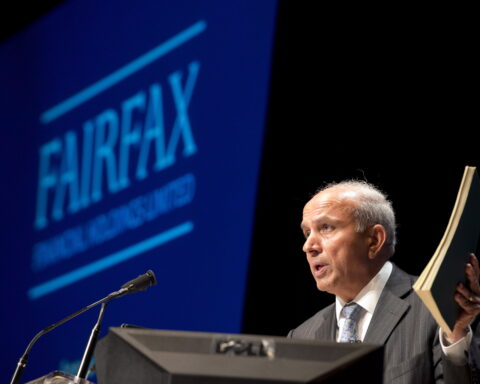The stock market delivered a swift and decisive judgment on Donald Trump’s election win last week.
Anticipating juicy growth in corporate earnings under the new administration, the U.S. stock market closed Friday up almost 5%, the biggest weekly percentage gain in a year. But clean energy stocks sank, as investors feared that Joe Biden’s pro-renewable program will give way to “drill, baby, drill” policies under Trump.
The decline in clean energy stocks despite an otherwise buoyant market confirms the uncertain reality facing sustainable finance. For the last two years, Republicans have waged a battle against environmental, social and governance investing, prompting many states to boycott ESG managers.
Before the vote, the very thought of a second Trump presidency inspired dread for many in the ESG community. But now a week after voting day, two schools of thought have emerged on how the Trump effect will play out.
While some industry leaders believe the sustainable finance community should lawyer up for a legal fight of mammoth proportions, others take a softer view. The latter group argues that the price advantage of clean energy, the resilience of ESG investments and pro-climate political considerations will prove stronger than the new administration’s policy attacks.
The pessimists: One billion tonnes more CO2
“The U.S. election is going to be a headwind for climate,” said Rebecca Mikula-Wright, CEO of the Investor Group on Climate Change, at the group’s annual summit in Melbourne, Australia, on November 7. Some other attendees agreed with the downbeat assessment.
“Donald Trump likes emissions,” said Greg Sharenow, managing director and portfolio manager at U.S-based asset manager PIMCO. “His positions are going to be distinctly supportive of additional emissions.”
If Trump makes good on all his climate and energy promises, it could delay the energy transition in the United States by 10 years or more, according to energy consulting firm Wood Mackenzie.
“A Trump administration means radical changes for tariffs on imports, climate policy and international affairs,” writes Simon Flowers, Wood Mackenzie’s chair and chief analyst. He says that Trump’s election along with probable Republican control of Congress makes it more likely there will be a delayed climate transition. “The U.S. will backtrack on net-zero.”
Trump will follow through on his promise to withdraw from the Paris Agreement on climate change, Flowers says in a post-election blog. The result will be felt as early as this week when the U.S. voice “will carry much less weight” at the United Nations COP29 climate summit.
In a report in May, Wood Mackenzie predicted that Trump policy changes would result in reducing low-carbon investments by US$1 trillion, resulting in one billion additional tonnes of carbon dioxide emissions by 2050. The Trump changes would hit the industry with a double whammy by removing tax credits and subsidies under the Inflation Reduction Act while raising costs through a general tariff on steel and equipment.
Trump is also likely to allow more permits for liquefied natural gas projects, new regulations favouring fossil fuels over renewables (blue rather than green hydrogen, for example) and rollbacks on methane caps and power-plant and vehicle-emission standards.
Natural gas demand will be 6% higher by 2030, the stock of electric vehicles will be 50% lower, and shutdowns of coal-fired power plants will be delayed under these changes, Wood Mackenzie says.
The optimists: Data centre demand, political pressure may dampen Trump effect
Some fund managers, asset owners and clean energy executives are taking a somewhat more positive view, saying that Trump’s policy actions will be blunted by political considerations and the sheer market demand for renewables.
“Policy is not the only driver of the energy transition, and the U.S. is not the only market for companies across the space,” writes Alex Monk, portfolio manager of global resource equities at Schroders. “While the shifting U.S. policy landscape is undoubtedly unhelpful, it should not distract from the strength of other forces encouraging investment in the space.”
The recent World Energy Outlook report from the International Energy Agency forecasts that renewable power capacity will rise from 4,250 gigawatts today to nearly 10,000 gigawatts in 2030, which together with nuclear power will generate more than half of the world’s electricity and create peak demand for fossil fuels by 2030. The report states that power demand is soaring for industrial consumption, electric mobility, cooling, and data centres and artificial intelligence.
Renewable power is well positioned to meet this demand because it has a huge cost advantage, says Connor Teskey, CEO of Brookfield Renewable Partners, one of the world’s largest clean energy companies.
Even if Trump cancels investment tax credits under the Inflation Reduction Act, Teskey says that power producers like Brookfield will be able to offset those credits with rate increases to utilities or corporate customers. “The key point there is because onshore wind and solar are so much cheaper than the alternatives, there is room to do that and still be the cheapest form of bulk electricity production,” he said in an investor call on November 8.
Political pressure from Republican members of the House will also likely reduce Trump’s ability to cut all tax credits and subsidies under the Bipartisan Infrastructure Law and the Inflation Reduction Act. Eighteen House Republicans have signed a letter asking for the tax credits to continue to protect wind, solar and battery projects already underway in their districts.
“President Trump will face a bipartisan wall of opposition if he attempts to rip away clean energy incentives now,” says Dan Lashof, director of the World Resources Institute.
Sustainable investment will be under attack. Can it survive?
Biden-administration regulations encouraging ESG investment and engagement are also in Trump’s crosshairs.
A Bloomberg Intelligence report issued after the election suggests that Trump will seek to limit the ability of shareholders to file proposals to companies on ESG matters. Recent more lenient rules from the Securities and Exchange Commission (SEC) have increased the number of ESG proposals by 47% since 2021.
It’s expected that Republican members of the House will reintroduce legislation allowing corporations to exclude ESG shareholder proposals from a vote at their annual meetings.
Before the election, Bryan McGannon, managing director and head of policy for the US Sustainable Investment Forum (US SIF), said that he is quite concerned about this potential legislation, because it would be more difficult to contest than regulation and would require Democratic majorities to repeal. “Shareholder rights is the thing [Republicans] will go after, and they have been trying to for ages,” he said.
The Bloomberg Intelligence report also says that Trump will revoke a Biden-administration rule permitting pension fund trustees to explicitly consider ESG issues in their investment decisions. A recent SEC rule requiring public companies to disclose their Scope 1 (facility) and 2 (energy) emissions will also be on the chopping block, the report says. “The bottom line is the Trump administration is anxious to undermine these ESG-related initiatives,” Bloomberg Intelligence analyst Rob Du Boff says.
However, the real impact of these two rollbacks may not be as bad as many fear.
A Trump regulation banning ESG consideration would most certainly be tested in the courts, McGannon said, and he believes it would not be upheld given the financial industry practice of using ESG for pecuniary issues of risk and return.
Related
What will the U.S. election mean for sustainable finance?
ESG squeezed between Republican attacks on ‘woke capitalism’ and climate investors
How fossil fuels have surged under both Trump and Biden-Harris administrations
And on carbon dioxide reporting, corporations are facing a growing trend worldwide to disclose CO2 emissions and risks, including in California, where CO2 reporting rules went into effect last year. U.S. companies operating in Europe will be subject to similar rules under the Corporate Sustainability Reporting Directive. McGannon said that large segments of corporate America will be subject to climate reporting regardless of what happens at the SEC.
Memo to ESG investors: Get a lawyer on speed dial
In a note to clients the day after the election, investment manager Jefferies Financial Group said there could be federal litigation based on the untested claim that financial institutions and climate activists have colluded to exert ESG pressure on businesses. “We’d encourage all ESG fund managers to have a lawyer on the team, or on speed dial,” the note said. “General counsels are in the ear of CEOs, frightened about legal retaliation to ESG initiatives.”
These attacks will have a chilling effect on ESG managers, said Jeff Gitterman, CEO of Gitterman Wealth Management, in an interview with Institutional Investor. “You are going to see ESG managers backing off more on how they market and publicly speak about what they are doing,” he said, adding that they will continue to incorporate ESG into investment decision-making, even if they don’t talk about it publicly.
US SIF CEO Maria Lettini is taking a guarded approach to the new administration and Congress. “Sustainable investing identifies unmanaged risks and unlocks investment opportunities in order to safeguard and increase long-term portfolio value,” she said in a post-election statement. “Investors require transparency through clear reporting requirements, the ability to engage the companies they own on financially material issues, and certainty that policymakers will support robust climate action. That remains true regardless of the political landscape. We commit to working with the next administration and other newly elected officials across the United States to advance a more just and sustainable American economy.”
The sustainable investment community looks to be taking a slow, cautious approach in dealing with the new administration. But it will also need to stand ready with lawyers and lobbyists when the policy battles begin.
Eugene Ellmen writes on sustainable business and finance. He is a former executive director of the Canadian Social Investment Organization (now the Responsible Investment Association).







